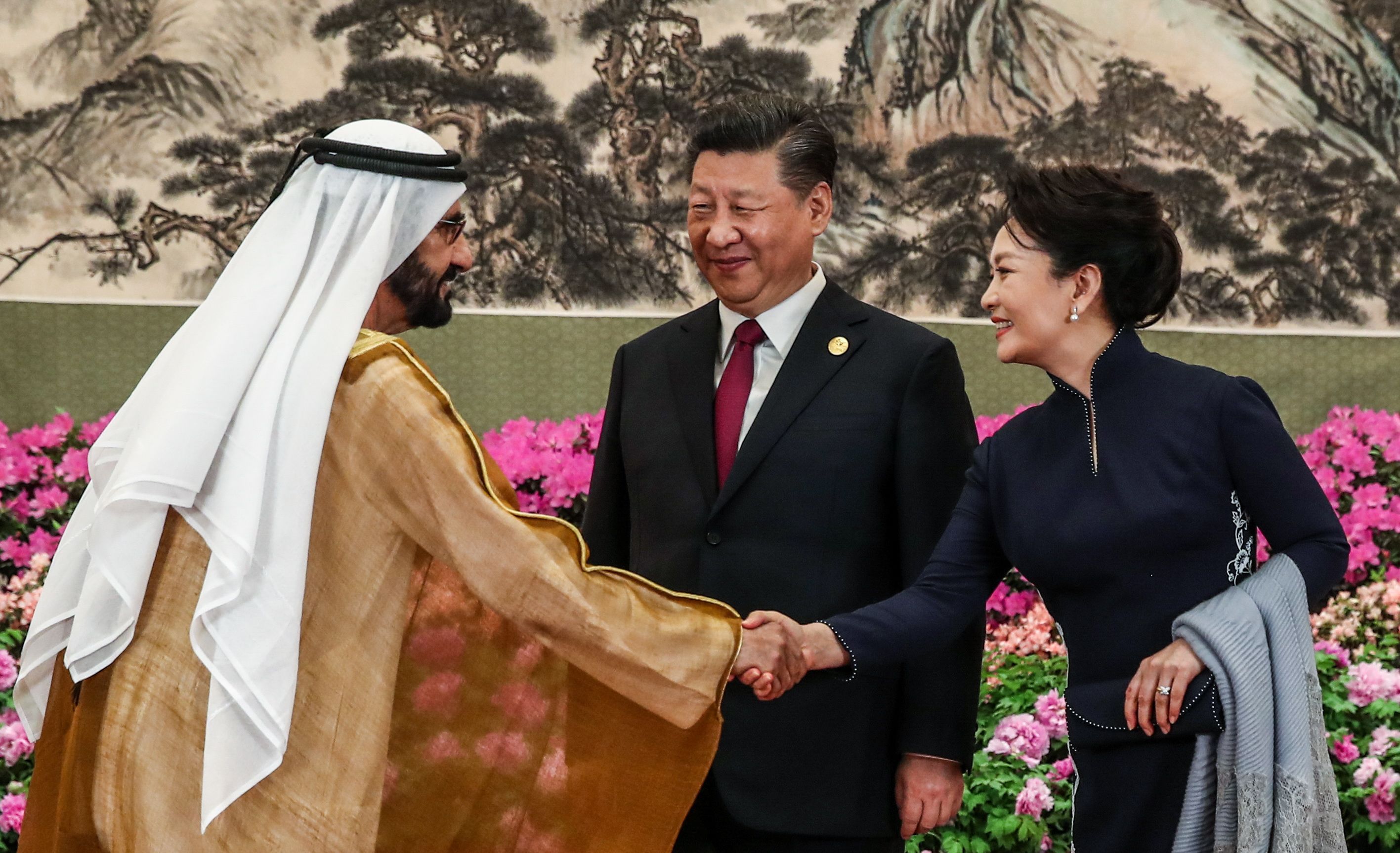
Mohammed bin Rashid Al Maktoum, vice president and prime minister of the United Arab Emirates, ruler of the Emirate of Dubai, China’s President Xi Jinping and his wife Peng Liyuan (L-R) ahead of a reception marking the Belt and Road Forum at the National Museum of China on April 26, 2019 in Beijing.
Valery Sharifulin | TASS | Getty Images
A move by China and the United Arab Emirates to expand trade and investment ties through new deals worth $3.4 billion “isn’t a surprise,” according to World Economic Forum President Børge Brende.
“China is now the second largest economy in the world and Asia is now 50 percent of global GDP,” Brende told CNBC’s “Capital Connection” on Sunday. “A lot of countries like the UAE see huge market opportunities in China.”
The UAE and China signed $3.4 billion worth of new deals on the weekend, as part of China’s Belt and Road Initiative — a massive infrastructure project that involves building roads, railways and shipping lines between China and more than 60 countries in Asia, Europe, Middle East and North Africa. The latest agreement is expected to boost an existing $53 billion worth of bilateral trade to $70 billion next year.
Vice President and Prime Minister of the UAE, Sheikh Mohammed bin Rashid Al Maktoum, participated in the Belt and Road forum in Beijing on the weekend, where he met Chinese President Xi Jinping to ink the deals.
China is already the UAE’s second largest trading partner, and the UAE serves as a major gateway for Chinese exports to the Middle East.
We’re living in a very different world than we did ten years ago. It’s a multipolar, multi-conceptual world.
Børge Brende
As part of the new deals, the two countries launched a number of new investments including the development of a 60 million square feet station at the new Silk Road in Dubai for Expo 2020.
“Our Chinese partner will invest $2.4 billion in using the station to store and ship Chinese products from Jebel Ali to the world,” Sheikh Mohammed, who is also the ruler of Dubai, said in a tweet on Saturday.
Expanding influence
The UAE has emerged as a key player in Xi’s Belt and Road initiative, which is attempting to link China by both sea and land to markets in Asia and Europe through a range of strategic, and oftentimes controversial, investments.
The project has led some to suggest that China is using the initiative to expand its economic and geopolitical clout — but Beijing has always rejected those criticisms.
“We’re living in a very different world than we did ten years ago. It’s a multipolar, multi-conceptual world,” Brende said.
“Multipolar, in the sense that we see much more geopolitical competition. It’s also multi-conceptual, because there are different ideologies out there. It’s not only one that we are used to, with the U.S. and western Europe way of running things, ” he added.
“In such a world, what I think is important is that we can find common ground and collaborate on these issues and not just compete with each other.”
UAE will be ‘vital’
The UAE will be “a vital station along the new Silk Road,” Sheikh Mohammed tweeted on Friday, when he announced plans for a $1 billion “Vegetable Basket” project that will import, process, pack and export agricultural, marine and animal products through the new Silk Road. The project is supported by the China-Arab Investment Fund, he added.
“The Arab-Chinese collaboration will positively contribute to the Belt and Road Initiative, given the Arab world’s strategic location that connects East & West,” Sheikh Mohammed tweeted.
The UAE government has also partnered with the World Economic Forum to launch “The Centre for Fourth Industrial Revolution” in the Emirates, the first of its kind in the region and the fifth globally.
The term “fourth industrial revolution” is defined as a “technological revolution … that is blurring the lines between the physical, digital and biological spheres.” It was a term first introduced by the founder and executive chairman of the World Economic Forum, Klaus Schwab.
The new initiative — a collaboration between the Dubai Future Foundation and the World Economic Forum — aims to develop mechanisms, applications and uses for the fourth industrial revolution in the UAE, according to a government statement.
“The fourth industrial revolution will shape the whole century,” Brende said. “Those nations that are on top of these new technologies, being artificial intelligence, internet of things, big data and autonomous vehicles, will come out of this century as the most prosperous ones.”
“I’m not surprised that the UAE and Dubai is in the forefront,” he added.

